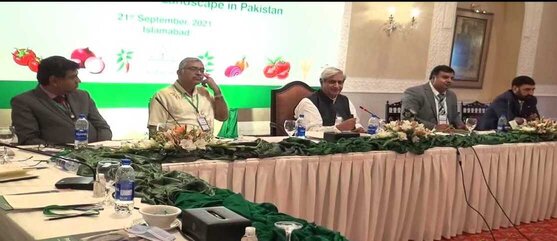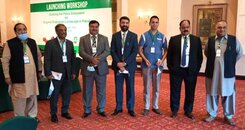Important Events
This section of the website contains detail of events that I have been participating to promote IPM and organic agriculture.
Launching workshop of organic agriculture policy to build the policy ecosystem for organic production landscape in Pakistan by CABI, Pakistan
21st September 2021 (Tuesday) at Serena Hotel, Islamabad
Under
Under the Chairmanship of Honorable Minister, Ministry of National Food Security and Research, Syed Fakhar Imam
This seminar was addressed by Dr. Babar Bajwa, Senior Regional Director- Asia (CABI), Dr Akmal Siddiq, Ministry of National Food Security & Research, Dr. Khalid Abdullah, Cotton Commissioner – MNFS&R, Abdul Rehman, Rep of WWF-Pakistan, Mr. Mashood Ahmed Siddique and me while sharing the Chair.

A brief summary of my speech at the workshop
First of all, I would like to thank CABI for organizing such a valuable workshop and giving me a chance to say a few words about our efforts to facilitate farmers to use fewer chemicals to grow their crops. Most of the speakers in this august forum seem passionate about organic agriculture. I am too. However, I have been found that farmers in Pakistan are convinced, rather believe, that they can neither grow their crops nor get better production without synthetic insecticides. In such a situation, I feel the path for organic agriculture in Pakistan shall pass through Integrated Pest Management and Integrated Nutrition Management.
Integrated Pest Management is a model where synthetic chemicals are used as the last defense line against conventional farming; the first is some chemicals. Last year, MNSUA helped us do various experiments with plant extracts and put up a list of seven plants, including Neem, Tobacco, Ak, Kuar Tumma & Heeng, which inhibited the increasing population of whiteflies. We used a mixture of these plants to substitute the chemical insecticides during the first sixty days.
In 2021-22, we did a live experiment on the cotton crop while setting up 120 IPM plots in all 41 Tehsils of South Punjab. We adopted a three-prong strategy.
1- No use of pesticides and fertilizers during the first 60 days of the cotton crop
2- Use organic plant extracts as a substitution
3- I all IPM methods fail, use pyrethroids on alternative weeks

During the whole crop season, we kept meeting twice a month to analyze the results of our advisories to farmers and introduce changes if something was not working. Besides, we focused upon alternative hosts of pests like Pink Bollworm and Whiteflies as a part of off-season management. Okra has been proved an alternative host plant for Pink Bollworm as well as whiteflies. Some other plants, including Eggplant, Shirin, Shishim, Herbs, etc., are also hosts of whiteflies. They build their colonies on these plants and attack crops when they find a breach in the cotton defence system. We developed monitoring layers of executive officers upon the Extention and pest warning field staff.
Naturally, we were interested to know the results. We requested MNS University of Agriculture Multan to conduct a detailed survey in all Tehsils of South Punjab.
This survey has proved that application of the IPM model in South Punjab is a success story.
